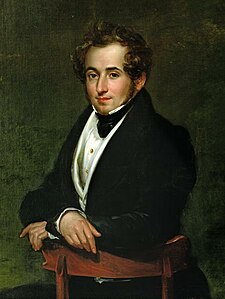
Pietro Lucchini
Vincenzo Salvatore Carmelo Francesco Bellini (Italian: [vinˈtʃɛntso salvaˈtoːre karˈmɛːlo franˈtʃesko belˈliːni] ; 3 November 1801 – 23 September 1835) was an Italian opera composer[1][2] famed for his long, graceful melodies[3] and evocative musical settings. A central figure of the bel canto era, he was admired not only by the public, but also by many composers who were influenced by his work. His songs balanced florid embellishment with a deceptively simple approach to lyric setting.
Born to a musical family in Sicily, he distinguished himself early and earned a scholarship to study under several noted musicians at Naples' Real Collegio di Musica. There he absorbed elements of the Neapolitan School's style and was inspired by performances of Donizetti's and Rossini's operas, among others, in more modern idioms. He wrote his first opera, Adelson e Salvini (1825), for the conservatory, and his next, Bianca e Fernando (1826), on a Teatro di San Carlo-affiliated commission for promising students. He also became close friends with his peer and first biographer, Francesco Florimo.
Bellini then went to Milan to compose for La Scala, where the success of Il pirata (1827) established his short but significant career. He wrote many celebrated operas, ascending to triumphal heights with I Capuleti e i Montecchi (1830, La Fenice), La sonnambula (1831, Teatro Carcano), and Norma (1831, La Scala), though not until later performances in the case of the latter. He traveled abroad and wrote I puritani after a visit to London. Its successful premiere[4] (1835, Théâtre-Italien) capped an illustrious international career. Bellini died at the age of 33 in Puteaux, France.
Verdi praised Bellini's expansive melodies as unequaled,[5] while Wagner, who was rarely complimentary, was captivated by Bellini's expressive integration of music and text. Liszt and Chopin were also admirers, though Berlioz was less enthusiastic. Most musicologists now assess Bellini positively, though some question the quality of his work.[6] Many of his operas, including Pirata, Capuleti, Sonnambula, Norma, and Puritani are regularly performed at major opera houses throughout the world.[7]
- ^ The Editors of Encyclopædia Britannica, "Vincenzo Bellini, Italian Composer", Encyclopædia Britannica, 15 January 2018
- ^ Lippmann & McGuire 1998, p. 389
- ^ Giovanni (no surname provided) to "Uncle Ignazio" ("identified as Ignazio Giuffrida-Moschetti, Catanese friend of Bellini" in Weinstock), 18 January 1832, quoted in Weinstock 1971, pp. 109–110: He was dubbed "the Swan of Sicily, or to phrase it better, of Catania".
- ^ Lippmann & McGuire 1998, pp. 389–390.
- ^ Verdi to Camille Belaigue, 2 May 1898, Lippmann & McGuire 1998, p. 392
- ^ Tim Ashley, "Opera must make you weep and die", The Guardian (London), 1 November 2001.
- ^ List of "671 performances of 146 productions in 95 cities" on Operabase, from 1 January 2012 into 2015 on operabase.com. Retrieved 24 June 2014